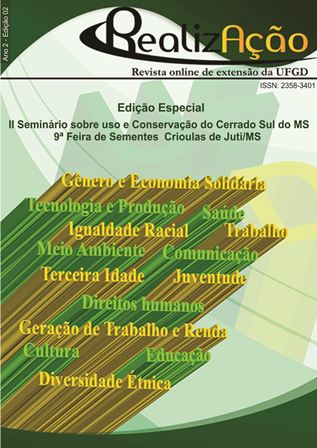Environmental Education at the Neil Fioravante school (CAIC): students' knowledge about sustainability
Keywords:
Awareness , Students , School garden , Educational lecturesAbstract
A vegetable garden in the school environment can be a living laboratory for the development of a wide range of educational activities in environmental and food education, acting as a complement to the teaching-learning process and encouraging collective work among the social agents involved. The work aimed to improve students' knowledge about science, technologies used in agro-industrial services, regional and local biology, conventional and unconventional vegetable cultivation, and food health, favoring the improvement of education and a healthier life for students in the educational environment. The methodology was developed in two stages: the first was the application of questionnaires to students before and after the lectures (Environmental Education, Sustainability and Planning: building a vegetable garden) given by students from the Biological Sciences course at UFGD, participants in the PETBio group. The second stage was the construction and maintenance of the garden at the institution. The results demonstrated an improvement in scientific knowledge. It was found that, in this case, it is essential that practical activities are followed by theoretical foundations, due to the dependence and conceptual errors evidenced by the students.
Downloads
References
ARAUJO, M. P. M.; DRAGO, R. Projeto horta: a mediação escolar promovendo hábitos alimentares saudáveis. Revista FACEVV, Vila Velha. N°6. Jan./ Jun. 2011.
CRIBB, S. L. S. P. Contribuições da Educação Ambiental e Horta Escolar na promoção de melhorias ao ensino, à saúde e ao ambiente. REMPEC – Ensino, Saúde e Ambiente, v. 3, nº 1, p. 42-60. 2010.
LUCCI, M. A. A proposta de Vygotsky: a psicologia sócio-histórica. Revista de currículum y formacíon del professorado, v.10, n°2, 2006.
MOREIRA, M. A.; CABALERRO, M. C.; RODRÍGUEZ, M. L. Aprendizagem significativa: um conceito subjacente. Actas del encuentro internacional sobre el aprendizaje significativo. Burgos, espanha, 1997.
MORGADO, F. S. A horta escolar na educação ambiental e alimentar: experiência do Projeto Horta Viva nas escolas municipais de Florianópolis. [Monografia] Universidade Federal de Santa Catarina. 2006.
RIBEIRO, R. Guia de compostagem caseira. Revista e ampliada. 2°ed., 2011.
Downloads
Published
How to Cite
Issue
Section
License
Copyright (c) 2014 Ana Isabel Sobreiro, Lucas Lopes da Silveira Peres, Rennan Garcia Leal da Costa, Valter Vieira Alves Junior, Zefa Valdivina Pereira

This work is licensed under a Creative Commons Attribution-NonCommercial-ShareAlike 4.0 International License.
Autores que publicam nesta revista aceitam as normas de publicação, bem como, concordam com os seguintes termos:
(a) O Conselho Editorial se reserva ao direito de efetuar, nos originais, alterações da Língua portuguesa para se manter o padrão culto da língua, respeitando, porém, o estilo dos autores.
(b) Autores mantêm os direitos autorais e concedem à revista o direito de primeira publicação, com o trabalho simultaneamente licenciado sob a Creative Commons Atribuição-NãoComercial-CompartilhaIgual 4.0 Internacional que permite: Compartilhar — copiar e redistribuir o material em qualquer suporte ou formato e Adaptar — remixar, transformar, e criar a partir do material. A Creative Commons Atribuição-NãoComercial-CompartilhaIgual 4.0 Internacional considera os termos seguintes:
- Atribuição — Você deve dar o crédito apropriado, prover um link para a licença e indicar se mudanças foram feitas. Você deve fazê-lo em qualquer circunstância razoável, mas de nenhuma maneira que sugira que o licenciante apoia você ou o seu uso.
- NãoComercial — Você não pode usar o material para fins comerciais.
- CompartilhaIgual — Se você remixar, transformar, ou criar a partir do material, tem de distribuir as suas contribuições sob a mesma licença que o original.
- Sem restrições adicionais — Você não pode aplicar termos jurídicos ou medidas de caráter tecnológico que restrinjam legalmente outros de fazerem algo que a licença permita.


